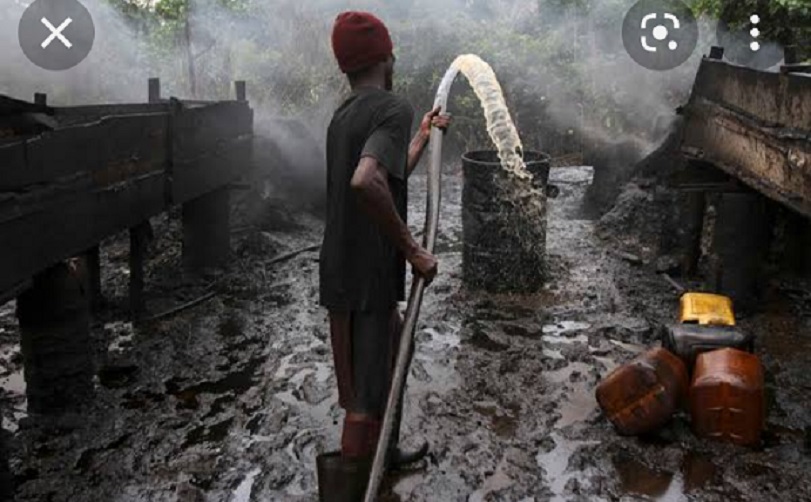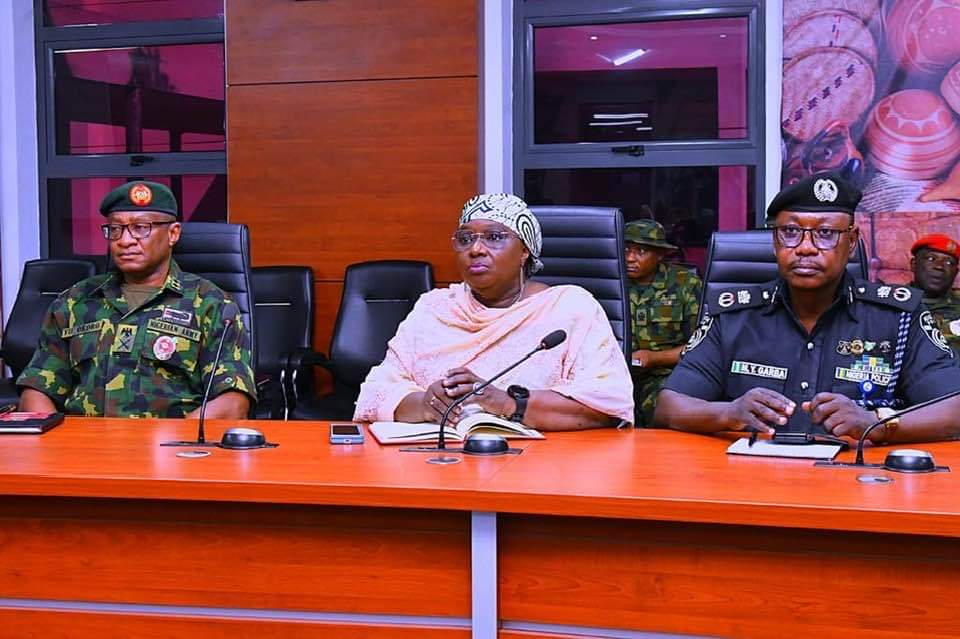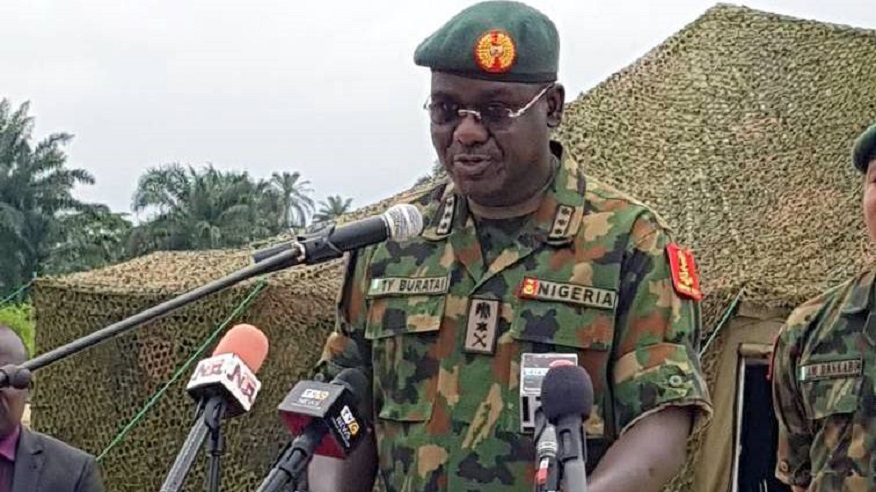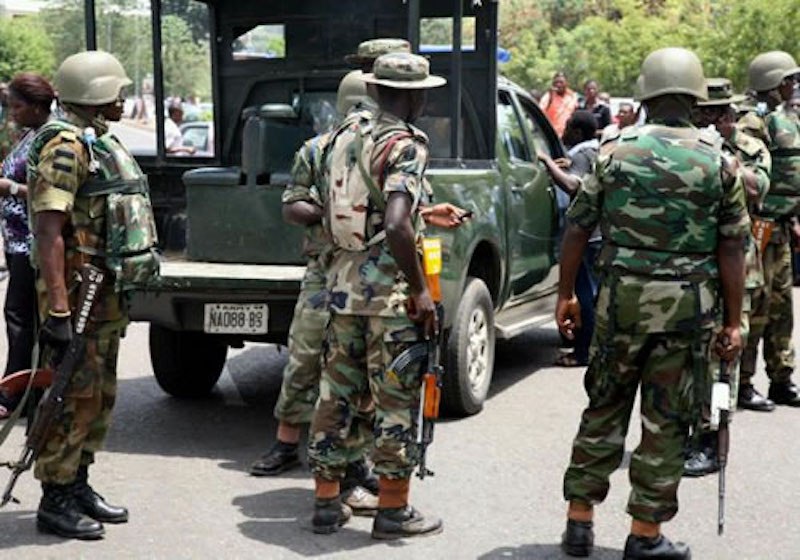Feature/OPED
The Nigerian Army, A Journey of Great Strides in Eyes of Observers
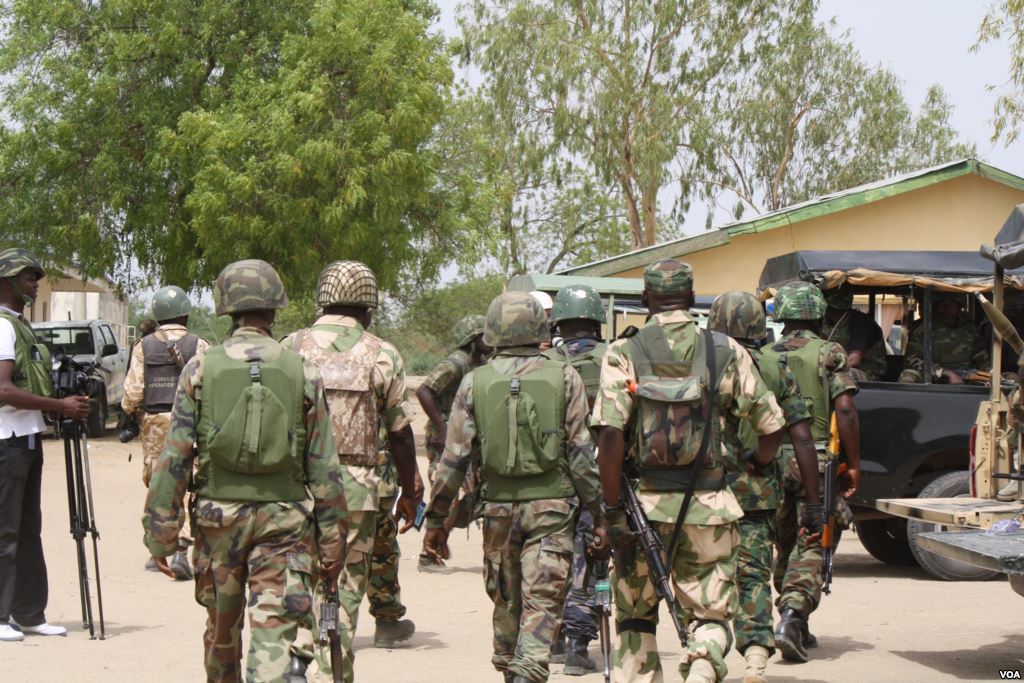
By Odeyemi Oladimeji
Celebrating our Gallant Soldiers — While we all are asleep, these Heroes are Awake, making sure we all sleep very soundly.
A critical look at the Nigerian Army and the war against Terror
Many will undoubtedly recall that the Nigerian president, Muhammadu Buhari, upon inauguration, made it clear where his priorities lie — Winning the war against terror and returning the Nigerian Military to the very positive place of total professionalism. That was how it all started from the 29th of May 2015.
Hitherto and before this present administration took over in 2015, of a major hindrance to winning the war against Terror was the very disturbing reports of army mutiny, Indiscipline, various cases of violations of the codes of war.
Such a destabilizing and debilitating situation was what the new administration and the new military heads inherited… And there was a war on Terror that was very far from being won.
Professionalism and Ethics in the Army
Professions create their own standards of performance and codes of ethics to maintain their effectiveness…
And the Nigerian Army is not left out in this venture.
In practice, and in context, this means that not only must Soldiers maintain the Army’s effectiveness, it must do so within the law, and the standards and moral code that make up the professional military ethics…. And in a situation that the Army, prior to May 2015, had been accused of many things, including Human Rights violations, it was a near chaotic situation that was met.
Ethical Contrasts
There are stark contrasts between military ethics and those of other professions, however. For example, whereas conventional ethics may say, “First, do no harm to civilians,” but in an unconventional war in which there are no standard armies but guerrilla-like Terrorists who mingle freely with civilians and wear no uniforms, keeping to professional military ethics become very difficult and will encompass, training and retraining of the army personnel and soldiers to be compliant still with the required ethics of war.
It was therefore a very serious matter for the post-May 2015 Nigerian Army to immediately begin the process that have come to be seen as one of the most important factors, leading to the huge successes recorded so far in the war Against Terror.
Choosing The battles in a War
A battle is a combat in warfare between two or more armed forces, or combatants.
A war sometimes consists of many battles.
Battles generally are well defined in duration, area, and force commitment.
A battle with only limited engagement between the forces and without decisive results is sometimes called a skirmish…
And there lies the difference in this war against Terror in which the battles were very many and diverse.
First and foremost, there was the battle within, in which the soldiers themselves were demoralized — Weapons were in short supply and reinforcements too long on coming. The anger was steadily building and ethics became a huge casualty.
Wars and military campaigns are guided by strategy, whereas battles take place on a level of planning and execution known as operational mobility… It was therefore a different kind of battle that the army now had to face when, these very strategies of the army gets leaked to the enemy as soon as they were made and mobility made redundant as the location of the Nigerian troops were frequently revealed to the enemy.
Any War at all, is fighting and operates in a peculiar element of danger…But not when there were leaks in the lines of command and sabotage among the ranks..!
War is served by many activities quite different from mere conjectures, so that innocent lives and lives of troops will not be lost.
The task therefore was to Retool the Army and rework it from the way of Arbitrariness, all of which concern the maintenance of the fighting forces.
These preparatory activities were quickly incorporated and included into the Army, Post-May 2015.
The meaning of the Training and the Retraining earlier mentioned is this.
The new Army leadership under , Lieutenant General Tukur Yusufu Buratai clearly understands, The Art-of-Unconventional-war, the actual conduct of this war, because they immediately became concerned with the creation, training, and maintenance of the fighting forces….
The implications of having a new leadership and the rejuvenation of the Army in handling this war on Terror, properly, in the right manner, has by extension brought along with it the use of modern civilian compliant means, by which less and less reports of human rights violations and condemnation by international human rights observers, became considerably, reduced.
The good things about these new models is that, once they have been developed for the purposes of an unconventional war, and they are seen to have succeeded, a new Vista is opened in the annals of warfare in which future engagements can be based.
The Victories of the Nigerian Army over Terror.
The Nigerian Army has recorded a string of victories against the Terrorists as a direct result of the redirection, retraining and repositioning that have happened in the past 30 months…!
In recent times due to efforts being boosted by support from President Buhari
A concerted push by the rejuvenated Nigeria’s military, has regained considerable ground in the fight against the Boko Haram Terror Group.
As at this very day, the Nigerian Army has repelled Boko Haram from all local government districts in the Northeast….
What remains are a few skirmishes, ambushes and isolated suicide bomb attacks, aimed at soft targets and not at a whole local governments, districts, villages, towns and cities.
And, as they inch closer to total victory, the military men and officers fighting the war against the Boko Haram sect in the Northeast are in high spirit!
A few weeks ago the Nigerian Army killed about 15 Boko Haram terrorists in Gwoza, Borno state, and the people, took to the street to celebrate the military victory over the insurgency.
The Nigerian troops attached to “Operation LAFIYA DOLE” under the ongoing Operation Deep Punch in the North-east region have cleared all the Boko Haram Terrorists’ camps in various confrontations in the in the past 30 months whilst suffering minimal casualties in the process, capturing high calibre arms and ammunition, particularly in the Lake Chad region.
The Terrorists, have been cleared out, from their hideouts in Metele village, Tumbun Gini and Tumbun Ndjamena in Borno State.
During the clearance operations, Boko Haram terrorists abandoned the area in disarray, leaving behind livestock, large quantity of foodstuff, motorcycles and donkeys.
Also in Metele, and other place, the terrorists have been completely destroyed and their gun trucks and and other equipment, captured.
The Intelligence War on Terror.
The Gallant Nigerian troops also have made many discoveries of Terrorists’ logistics base at Tumbu Ndjamena which held stocks of fish, foodstuffs, fuel and motorcycles. All these items were promptly destroyed.
In all of these Intelligence work truly paid off as information gathering and effective civilian collaboration and handling have led the army to many of these victories… Sadly, some Nigerian troops paid the supreme price for securing the great peace and relief we all are enjoying today. Specifically, the high spirit among the troops that continues to define the cohesion and camaraderie that have led to these strings of successes.
The Human Rights Abuse allegation against the Nigerian Army.
Despite these strings of successes and the high morale, professionalism and ethics, restored into the Nigerian Army, there were not to be unexpectedly, a few allegations of human rights abuses against the Nigerian Army in her conduct of war against Terror.
And a responsive government of President Muhammadu Buhari rose to the task by the then Acting President, Prof. Yemi Osinbajo, releasing a statement to the effect that it is the responsibility of the Federal Government and the Armed Forces to ensure that the military conform with the international best practices on human issues.
Vice president Yemi Osinbajo as the Acting President then, stated this while inaugurating a nine-man presidential panel to review allegations of human right abuses by the military charged the panel to find out whether they carried out their duty diligently, impartially and with all sense of professionalism, in August of 2017.
He said, “It is the responsibility of the armed forces and those of us in government to ensure that we interrogate our own activities and ensure that those activities meet up to human rights norms and basic rules of decency observed across the world.”
The panel was given the mandate to review compliance of Armed Forces with human rights obligations and rules of engagement.
You may recall that in June, 2015, President Muhammadu Buhari directed the military to conduct an internal inquiry into allegations of rights abuses by its personnel.
The then Acting President also praised the Nigerian military saying “it is also a well – known fact that the conduct of the country’s defence and security forces during insurgency in the North East and militancy in the Niger Delta has in recent times attracted significant commendations.”
The members of the Panel were Hon. Justice Biobele Geogrewill who is appointed to serve as Chairman Maj. Gen. Patrick Akem, Olawale Fapohunda, Mrs. Hauwa, Jibrin Ibrahim, Mr. Abba A. Ibrahim, Mrs Ifeoma Nwakama, Dr. Fatima Alkali, Counsel to the Panel, while Mr. S. Halliru is the Secretary (OSGF)
Responding on behalf of other members of the panel the Chairman, Justice Biobele Georgewill assured they will put in their best in order to uphold the confidence reposed on them by the government.
The panel sat in the geopolitical zones and cases even as far back as 2007 were brought to the fore.
The one good and interesting thing is the openness under which the whole exercise was conducted.
No one was barred, including notable human rights lawyers were also made submissions.
Boko Haram suspects were also allowed to make their inputs, that altogether, a very thorough job was done by the panel on the laudable platform of determining the credible claims from the spurious ones… The task was completed without a hitch with no glitch in November of 2017.
Though the report is yet to be released, the report citing Army/Nigerian relations in the last two years will no doubt be favourable.
Improved Army/Civilian Relations.
It is pertinent to make a reference to the period of Nigeria’s independence to date, in determining how far the nation has gotten with managing the Military/Army/Civilian relations.
After independence, the Nigerian Military, especially the Army, gave a good account of itself by rescuing the country from the precipice. And this happened not just once but several times because we had internal security problems in Nigeria, some of which are as a result of the deficiencies of other security agencies in the country. So, it has always been the Nigerian military that rises to the occasion. We must give it to them. They did a lot during the Civil War; we should commend them for that. Again we had situations of insurgency and they have done wonderfully well.
However, the situation started to change, when the military became active in politics….
Military involvement in politics has somewhat since then, made them antagonistic to the civil population.
This perception has waned only a little since the beginning of the 4th Republic in 1999.
In recent years, the Army/Civilian relations has been somewhat low-keyed, especially during the years the Boko Haram Terror held sway.
Undoubtedly also, the clear and detailed army victories against Terror have brought a new resurgence in the otherwise low-tide of checkered relations in which the people’s confidence and empathy have started to rise again.
Nigerians now celebrate great victories and also deeply mourn their fallen heroes wherever and whenever our Gallant Soldiers pay the Supreme price of service to fatherland with their lives.
And lately, we are seeing a lot of modest changes within the military from 2015 to date.
They have done a lot to improve the Army/Civilian relations to ensure that their professional calling is done within the ambit of the law, with respect to human rights, due process and professionalism.
In this regard the military is becoming professional, is maturing, becoming much more advanced and is fixing itself very well.
Lately also, the Nigerian Army is doing some programmes to ensure that the common man is made to appreciate the activities of the military….
Civilian Schools are incorporated into the Civil/military Healthcare delivery system. And also in tackling crimes of kidnappings and armed robberies.
In Truth Army/Military/Civilian conflicts happen everywhere in the world. Therefore, bridging the gap between the common man and the military is desirable even though it will take some time.
Worthy of note also in the rescue of nearly 50% of all the kidnapped Chibok girls, by the Nigerian Army.
First, it was 21 girls out of the 240 kidnapped. Then 81 girls at a go.
And random numbers in twos and threes and the 107th Chibok Girl, Salomi Pagu just rescue only a few days back.
A conclusion
Concluding this article, must rest on the commitment of the Army, to service, which anchors on safely International Core Values of the military.
The core values of all the military services, including the army, reflect honour, courage, integrity and a commitment to the ideals upon which the nation’s core values are based.
The Nigerian Army presents these values as loyalty, duty, respect selfless service, honour, integrity and personal courage. The other services too, consolidate these same ideals.
The responsibility of carrying these ideals into the battlefield and exercising same among civilians is a function of Leadership. And this is where leading from the front has become the watchword of the rejuvenated Nigerian Army.
A war is not a fair exercise, it is neither fun or always necessary…. But it happens, in order to defend a Nation and secure its peace.
Military ethics require war to be just, however. The philosophical theory of the just war requires war to be the last result. These are the very words and attitude displayed by the present Nigerian Army leadership. It is only then a war is deemed a just war, and it is then fought to correct a wrong, just as the Nigerian Army is doing fighting the war on terror.
The goals of The Nigerian Army, is to establish peace, not continue violence unnecessarily. Excessive violence is unacceptable and civilians must not be the deliberate targets of violence — That is the message from the Chief of Army Staff, Lieutenant General Tukur Yusufu Buratai.
Comrade Oladimeji Odeyemi, A Counter terrorist analyst and a Security Expert, is the Convener of the Coalition of Civil Society Groups against Terrorism in Nigeria sent this piece from Ibadan, Oyo State.
Feature/OPED
The Price of Fake Life at This Time!

By Timi Olubiyi, PhD
In Lagos, Nigeria, like other African cities, Johannesburg, Cairo, and Nairobi, among others, the pressure to appear rich has reached disturbing heights. Amid a backdrop of rapid urbanization and economic uncertainty, social media platforms have only intensified this pressure, making it feel as though success is synonymous with material wealth.
From sleek cars on the streets of Lekki, Victoria Island, or Ikejaand flashy social media posts make it hard to ignore the overwhelming desire to flaunt wealth in Lagos Nigeria.
In recent time, the extravagant parties and designer clothes, the pursuit of outwardly projecting affluence has become an obsession, leaving many trapped in a cycle of debt and despair. The unfortunate paradox here is that it’s difficult for a broke person to keep up the appearance of affluence for long, while a rich person, paradoxically, can play broke every day of the week without breaking a sweat.
But the problem runs much deeper than just appearances; it has become a silent epidemic that has wreaked havoc on the mental and physical well-being of countless individuals. This pressure to appear wealthy, fueled by the desire for social validation, has now crossed dangerous thresholds, often leading to extreme consequences.
With Nigeria facing one of its highest inflation rates in decades, the economic landscape has made it increasingly difficult for many people to simply make ends meet. A devalued Naira, skyrocketing prices of goods, and unpredictable economic policies are forcing individuals to make impossible choices. For the young, the hungry, and the vulnerable, social media platforms such as Instagram and Twitter have become breeding grounds for comparison, feeding into the illusion that wealth is easily attainable.
What most people fail to see, however, is that the “rich” lifestyle they covet is often unattainable for anyone not already possessing considerable resources. The consequence? A generation of individuals who feel forced to live beyond their means, often going into debt or risking their lives to maintain a false image of success.
Even worse, the financial pressure to appear rich can often spiral into even darker consequences. In recent years, Lagos, Ilorin and many parts of Nigeria have seen a surge in ritual killings, kidnapping, and other terrible crimes often linked to the dangerous desire to accumulate wealth, or at least the appearance of it.
These violent crimes are often perpetrated by those who, due to lack of opportunities, have found themselves cornered by an economic system that rewards only those with visible wealth, no matter the means.
This disturbing trend feeds directly into the cycle of social media glorification, where a brazen display of wealth often gathers admiration, and in some cases, even envy. This desire to appear rich without any meaningful livelihood has led to a breeding ground for criminality and social vices.
Young people, especially, are finding themselves caught in this dangerous web, where they feel the need to flaunt wealth they do not have in order to gain respect and social media validation. The pressure is unbearable, and the consequences can be life-altering. As inflation continues to rise, the temptation to adopt a fake life becomes even more pronounced, with people willing to do anything whether fraudulent or violent to escape the crushing grip of financial instability.
Those who truly understand the value of money often prefer simplicity, investing in long-term growth rather than short-term gratification. It’s a lesson that the majority in Lagos and other Nigerian cities need to learn: living within your means, focusing on long-term financial growth, and avoiding the temptation to project affluence for approval will lead to more sustainable happiness.
Financial stability does not come from showing off; it comes from sound financial decisions, investments, and the ability to live within one’s means. Instead of chasing a lifestyle that is unattainable for most, focus on building something that lasts. Seek opportunities to learn about personal finance, invest in skills, and explore sustainable business ideas.
Consider putting money into assets that appreciate over time, such as real estate, stocks, or even a side hustle that offers long-term returns. Building a meaningful life also means finding value beyond material possessions. Pursue personal growth, invest in relationships, prioritize health, and learn to appreciate the things that truly bring happiness family, knowledge, experiences, and personal fulfillment.
In conclusion, while Lagos and other Nigerian cities continue to be hotbeds for the illusion of wealth, it is crucial that we shift the narrative. Let’s break the cycle, resist the pressures to conform, and begin making thoughtful, sustainable choices that can lead to true success, one built on a life of purpose. Only then can we break free from the chains of societal expectation and find lasting happiness, without risking everything in the pursuit of a fake life. The key to navigating this period is by adopting a meaningful private life and investing in things that matter, not in what the world sees. Good Luck!
How may you obtain advice or further information on the article?
Dr Timi Olubiyi is an Entrepreneurship and Business Management expert with a PhD in Business Administration from Babcock University, Nigeria. He is a prolific investment coach, columnist, author, adviser, seasoned scholar, Chartered Member of the Chartered Institute for Securities & Investment (CISI), a member of the Institute of Directors, and a Securities and Exchange Commission (SEC)-registered capital market operator. He can be reached on the Twitter handle @drtimiolubiyi and via email: drtimiolubiyi@gmail.com, for any questions, reactions, and comments.
The opinions expressed in this article are those of the author, Dr. Timi Olubiyi and do not necessarily reflect the opinions of others.
Feature/OPED
A Call for Global Action as Ethiopia Hosts Climate Summit

By Atiklit Atnafu Naramo
Ethiopia, a nation with over 3,000 years of civilisation and home to more than 80 ethnic groups, is set to host the second Africa Climate Summit (ACS2) from September 8 to 10,2025, in its capital, Addis Ababa.
The country, often referred to as the Land of Origin owing to its status as the cradle of human ancestry, and as the second most populous and geostrategic nation in Africa, plays a significant role on the continent.
Addis Ababa is emerging as an important diplomatic hub, frequently hosting various international conferences and summits. This trend is enhancing the city’s reputation as a centre for global dialogue and collaboration.
In recent years, the growing concern over climate trends and their potential impacts on both the environment and the socio-economic fabric of societies has positioned climate change as a critical topic of global discourse. Before delving into the causes, evidence, potential impacts, and adaptations related to climate change, it is essential to first understand what climate change entails.
Climate change is a pervasive global threat that has been unfolding over an extended period, with its manifestations posing significant risks to the stability of societies, as well as to natural and managed ecosystems. The rise in ambient temperatures and the alteration of related environmental processes are directly linked to increasing concentrations of anthropogenic greenhouse gases (GHGs) in the atmosphere.
While climate change can result from natural internal processes or external forces, its persistent anthropogenic influences have become increasingly evident. In the 21st century, issues such as migration, terrorism, and the proliferation of weapons of mass destruction have emerged as critical challenges that transcend national borders. Among these, climate change stands out as one of the most formidable challenges humanity faces in its relationship with nature. The complexity of climate issues necessitates a collective global response, emphasizing the urgent need for international collaboration and action to address this pressing crisis.
As a nation committed to addressing the pressing of climate change, Ethiopia has aligned its efforts with the Paris Agreement’s goals of limiting the global average temperature increase to well below 2 °C above pre-industrial levels, and striving to limit the increase to 1.5 °C. The Ethiopian government recognizes the devastating impacts of climate change on its people, environment, and economy, and is committed to taking immediate global action to enhance climate resilience and reduce greenhouse gas (GHG) emissions.
Ethiopia’s long-term low emissions development strategy (LT-LEDS) aims for net-zero emissions by 2050, setting an ambitious example for others to follow. This strategy complements Ethiopia’s Climate Resilience and Green Economy strategy, which was outlined in the Ten-Year Development Plan: A Pathway to Prosperity (2021-2030). This plan aims for an annual economic growth rate of 10.2% while prioritizing the establishment of a climate-resilient green economy. It includes specific targets to enhance Ethiopia’s capacity for reducing greenhouse gas emissions from 92.7 MtCO2e to 162.3 MtCO2e by 2030.
Despite these ambitious goals, current projections indicate that emissions may rise to between 197-220 MtCO2e by 2030, representing a 62-81% increase compared to 2010 levels. In response to this challenge, Ethiopia has taken significant steps under leadership of PM Abiy Ahimed (PhD) such as green legacy initiatives planting billion of trees every year, a large-scale reforestation program targeting 700 million trees in 2025. banning the import of all internal combustion engine vehicles in 2024, becoming the first country to do so. Additionally, policies have been introduced to incentivize electric vehicle (EV) adoption, including tax exemptions and reduced import tariffs for locally assembled EVs.
The forthcoming ACS2 will be co-convened by the Ethiopian government and the African Union Commission under the theme “Accelerating Global Climate Solutions: Financing for Africa’s Resilient and Green Development.” The summit will showcase Africa-led climate solutions and focus on unlocking climate finance, positioning the continent as a key player in the global climate response.
The urgency of the climate crisis cannot be overstated; 2024 is projected to be the hottest year on record, with 2025 likely to surpass it. African nations, despite contributing less than 4% of global greenhouse gas emissions, are disproportionately affected by climate change, often spending over 5% of their GDP on climate-related responses. This diverts critical resources from essential development sectors such as health and education.
The ACS2 aims to bring together 45+ African heads of state, policy makers, scholars and different stake holders, to spotlight Africa’s leadership and innovation in combating the climate crisis. It seeks to establish a united African voice ahead of COP30, emphasizing principles of multilateralism, equity, and respect for international rights frameworks. The summit will champion partnerships that promote nature-centred investments, innovative solutions, and sustainable practices.
Ethiopia calls upon the international community to support Africa in creating green energy solutions and building climate-resilient economies. The ACS2 will serve as a platform for mobilizing political and financial action to address the climate crisis, advocating for reforms in the global financial system that reflect Africa’s realities and priorities, particularly in renewable energy access and climate adaptation.
In conclusion, the ACS2 represents a pivotal opportunity for African nations to assert their leadership in global climate governance, fostering a future that prioritizes sustainability, resilience, and equitable development.
ACS2 will also deepen South–South cooperation and foster a new era of global partnerships rooted in equity, innovation, and African-led solutions. The long-term impact will be a strengthened continental position that not only influences COP30 but alsoinstitutionalizes Africa’s leadership in global climate governance, through collective efforts and international support, Africa can catalyse transformative change in the global response to climate change.
Climate change has no borders our solution should not either.
Atiklit Atnafu Naramo is the Second Secretary at the Ethiopia Embassy in New Delhi
Feature/OPED
Nigeria’s Vanishing Savings: $10bn Subsidy Removed, Yet Reserves Stuck at $41bn

By Blaise Udunze
When the Nigerian government scrapped the decades-old fuel subsidy in 2023, it promised relief for the nation’s bleeding finances. Nearly $10 billion was to be freed up annually, and by scrapping it, President Bola Tinubu’s administration projected that the fiscal space created could be channeled into education, infrastructure, social investment, and healthcare.
The International Monetary Fund (IMF) and the World Bank praised the move as a sign of long-awaited economic discipline. But the move, championed as a patriotic sacrifice, came with painful consequences: fuel prices quintupled, increasing by about 514 percent from N175 in May 2023 to N900 as of today; inflation is now at 21.88 percent, and the cost of living hit historic highs, inflicting more pain on the already impoverished Nigerians.
But one year later, one critical figure exposes a troubling paradox: Nigeria’s Federal Reserve remains stuck at around $41.046 billion, almost the same level as before subsidy removal. For many Nigerians, the obvious question is, where did the money go?
The Numbers Don’t Add Up
Officially, subsidy removal was meant to ease fiscal pressure and rebuild foreign reserves. Yet, the reserves have barely moved, even as citizens endure economic hardship.
Independent economists argue that the supposed “savings” are being quietly swallowed by corruption, inefficiency, and shadowy financial obligations.
“The government keeps announcing that billions are saved, but the reserves don’t reflect it, and the people don’t feel it,” says Abuja-based analyst Dr. Nnamdi Okeke. “It raises the suspicion that subsidy savings have simply disappeared into the same black hole of mismanagement.”
Debt and Dollar Drain
One explanation offered by officials is debt servicing, which consumes a staggering portion of national revenue. But critics argue that this alone cannot account for the stagnant reserves. Instead, they point to:
– Opaque fuel import contracts that continue despite subsidy removal, with Nigeria still importing refined petroleum.
– Unaccounted forex interventions by the Central Bank of Nigeria, where billions vanish into stabilizing the naira with little transparency.
But recently, the CBN governor, Yemi Cardoso who spoke at the spring meetings of the IMF and the World Bank, disclosed that the naira is performing independently, as the apex bank’s key monetary policies salvaged the naira from devaluation and not because the foreign reserves were used to defend it.
– Leakages and corruption within ministries and agencies that fail to publish clear records of subsidy savings and allocations.
– Shoddy revenue-sharing formulas that become “loot-sharing formulas.” Part of the tragedy is that while the revenue generated is expected to be channeled to federal reserves, it is often diverted into corrupt networks; the elite share billions; the people face poor roads, underfunded hospitals, failing schools, and mass unemployment.
The government has increasingly turned to borrowing as its lifeline for development.
From highways and railways to schools, hospitals, and social investment schemes, government loans -both domestic and foreign as the engine behind many of the country’s most ambitious projects. With the rising debt profile, the question again is, where did the subsidy removal fund go?
“There’s no transparency,” says an insider at the Ministry of Finance, speaking anonymously. “The books are not open. Nigerians are told savings exist, but there’s no breakdown, no audit, and no accountability. Meanwhile, reserves are flatlined.”
Citizens Pay, Elites Gain
The removal of subsidies has hit citizens hardest. Transport fares have doubled, food prices are suffocating households, and SMEs are shutting down. Yet, elite profiteers in oil importation, government contracts, and currency speculation continue to thrive.
“It feels like the sacrifice of millions is subsidizing corruption, not the economy,” laments Port Harcourt-based teacher Chika Nwankwo. “We tightened our belts, but the politicians keep widening theirs.”
Lessons from other Crude Oil-Producing Nations
Other nations that are yet to fully remove subsidies, like Saudi Arabia and Indonesia, but have significant reforms underway, have steadily grown their foreign reserves to the tune of $410 billion and $153 billion, respectively. These countries paired the reform with clear reinvestment into social welfare and infrastructure, making the benefits visible to offset the economic impact on vulnerable populations and ensure broader public support. Indonesia, for instance, expanded social assistance programs and shifted towards direct household subsidies, while Saudi Arabia focused on providing alternative energy sources and other measures to support its citizens.
In Nigeria, however, the absence of transparency and targeted relief has turned reform into a source of anger and suspicion.
The Auditor General’s office has not published a comprehensive account of how subsidy savings were used. Civil society groups are now demanding independent investigations, fearing that the billions have been misappropriated.
FAAC Allocations: Higher Revenue, Same Mismanagement
To be fair, one area where subsidy removal is visible is in the Federation Account Allocation Committee (FAAC) disbursements. Since 2023, allocations to federal, state, and local governments have significantly increased, with record revenues shared across the three tiers of government.
But this “windfall” has not translated into reserve growth or tangible improvements in citizens’ lives. Instead, fiscal leakages, wasteful spending, and reckless recurrent expenditures have absorbed much of the extra revenue.
Analysts warn that without discipline, the increased FAAC allocations only fuel the same old cycle: more money in government hands, but little to show in infrastructure, education, healthcare, or poverty reduction.
A Hollow Reform?
For many experts, the stagnant reserves signal a deeper rot: Nigeria’s economy is not suffering from a lack of revenue but from a failure of governance.
Savings exist on paper, but corruption, mismanagement, and opaque financial practices erase them before they reach the people.
“The problem isn’t subsidy removal; it’s what happens after,” says Dr. Okeke. “We removed the subsidy, but we didn’t remove the thieves.”
Conclusion
The government asked Nigerians to endure pain for long-term gain. But with $10 billion supposedly saved, reserves still stuck at $41 billion, and FAAC allocations hitting record highs, the gain is nowhere in sight.
Until transparency replaces opacity and accountability trumps corruption, subsidy removal risks becoming just another chapter in Nigeria’s long history of economic betrayal. Higher revenues without prudent management only deepen reckless expenditure, and Nigerians continue to pay the price.
-

 Feature/OPED6 years ago
Feature/OPED6 years agoDavos was Different this year
-
Travel/Tourism9 years ago
Lagos Seals Western Lodge Hotel In Ikorodu
-

 Showbiz3 years ago
Showbiz3 years agoEstranged Lover Releases Videos of Empress Njamah Bathing
-

 Banking7 years ago
Banking7 years agoSort Codes of GTBank Branches in Nigeria
-

 Economy2 years ago
Economy2 years agoSubsidy Removal: CNG at N130 Per Litre Cheaper Than Petrol—IPMAN
-

 Banking2 years ago
Banking2 years agoFirst Bank Announces Planned Downtime
-

 Sports2 years ago
Sports2 years agoHighest Paid Nigerian Footballer – How Much Do Nigerian Footballers Earn
-

 Technology5 years ago
Technology5 years agoHow To Link Your MTN, Airtel, Glo, 9mobile Lines to NIN



